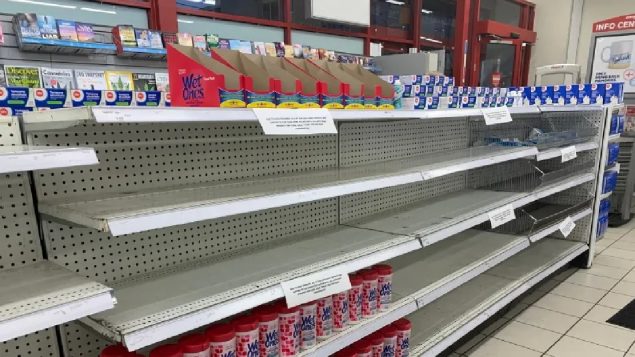Unfortunately, it is perhaps not to be unexpected that people and companies would try to take advantage of others concerns and profit from it.
While there have been cases of individuals bulk buying scarce products to create temporary shortages and resale at higher prices, it seems some businesses may be doing so as well. But, there are laws against it.
A company in Calgary Alberta has now been charged with gouging, that is charging highly inflated prices over what might be considered ‘normal’ prices for those products which might be considered ‘essential’ in the health emergency..
While there are hundreds of investigations and warnings to companies that have been handed out in several provinces, the Alberta company appears to be the first to have been chargec.
The Canadian Press has identified the company as CCA Logistics and the owner as Yan Gung. He is quoted by the CBC saying due to global competition his costs are higher to bring in the products in so he has to charge more to customers.
An Alberta Consumer Investigations Unit inspector on April 1 found grossly inflated prices for personal protective equipment such as:
- 3M masks – $120 (400 per cent markup)
- Hand sanitizer – $39 (200 per cent markup)
- Vitamin C (two-pack) – $30 (100 per cent markup)
- Hand soap – $10 (300 per cent markup)
- Lysol spray – $25 (250 per cent markup)
It is important to note, that the charges have not been proven in court.
Alberta, British Columbia and Saskatchewan were the only three provinces with specific legislation against price gouging prior to the pandemic.
With its declaration of a health state of emergency Ontario added rules on gouging related to the pandemic.
On March 26, Ontario Premier Doug Ford tweeted that Price gouging and reselling essential items that vulnerable people count on is UN-CANADIAN, it’s wrong, and we are putting an end to it!

Ontario Premier Doug Ford (twitter)
The rules prohibit selling of “necessary goods at unconcionable prices”. Such goods include
- Masks and gloves used as personal protective equipment in relation to infections.
- Non-prescription medications for the treatment of the symptoms of the coronavirus.
- Disinfecting agents intended for cleaning and disinfecting objects or humans.
- Personal hygiene products, including soap products and paper products.
In Ontario, the Toronto Star reports government agencies had recieved over 22,000 price gouging complaints since the end of March with over 8.000 reviewed by the Consumer Protection service. About 500 businesses have recieved warnings and about 200 had been referred for police and local bylaw investigations.
Nova Scotia had enacted similar laws with its own Emergency Management Act, which specifically provides that no person “may charge higher prices for food, clothing, fuel, equipment, medical or other essential supplies or for the use of property, services, resources or equipment than the fair market value of the same thing immediately before the emergency.”
In all provinces where gouging is determined, fines can range from the hundreds to thousands of dollars for individuals, $100,000 and up for corporations and directors, and may also include a prison sentence. The potential penalties differ from province to province but all can be can quite severe.
additional information – sources
- Gov’t of Alberta: May 8/20: Calgary business charged with price gouging
- Canadian Press (via CBC): May 9/20: Calgary based company charged with pandemic price gouging
- Western Producer: May 8/20: COVID overpricing charges laid in Vancouver
- TorStar: R Benzie: May 11/20: Premier Doug Ford’s fight against COVID19 price gouging leads to 200 police investigations
- TorStar:D Quan: Mar 12/20: ‘We’re hustlers’ Amid coronavirus fears this couple has made $100,000 reselling Lysol wipes







For reasons beyond our control, and for an undetermined period of time, our comment section is now closed. However, our social networks remain open to your contributions.